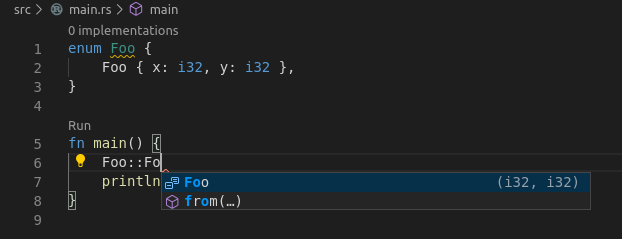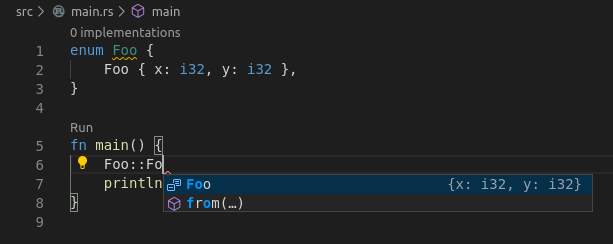| Commit message (Collapse) | Author | Age | Files | Lines |
|---|
| | |
|
| | |
|
| |\
| |
| |
| |
| |
| |
| |
| | |
3519: Show mod path on hover r=matklad a=SomeoneToIgnore
Closes #1064
Co-authored-by: Kirill Bulatov <[email protected]>
|
| | | |
|
| | | |
|
| |\ \
| | |
| | |
| | |
| | |
| | |
| | |
| | |
| | |
| | |
| | | |
3513: Completion in macros r=matklad a=flodiebold
I experimented a bit with completion in macros. It's kind of working, but there are a lot of rough edges.
- I'm trying to expand the macro call with the inserted fake token. This requires some hacky additions on the HIR level to be able to do "hypothetical" expansions. There should probably be a nicer API for this, if we want to do it this way. I'm not sure whether it's worth it, because we still can't do a lot if the original macro call didn't expand in nearly the same way. E.g. if we have something like `println!("", x<|>)` the expansions will look the same and everything is fine; but in that case we could maybe have achieved the same result in a simpler way. If we have something like `m!(<|>)` where `m!()` doesn't even expand or expands to something very different, we don't really know what to do anyway.
- Relatedly, there are a lot of cases where this doesn't work because either the original call or the hypothetical call doesn't expand. E.g. if we have `m!(x.<|>)` the original token tree doesn't parse as an expression; if we have `m!(match x { <|> })` the hypothetical token tree doesn't parse. It would be nice if we could have better error recovery in these cases.
Co-authored-by: Florian Diebold <[email protected]>
|
| | | | |
|
| | |/ |
|
| | | |
|
| | | |
|
| |/ |
|
| | |
|
| |
|
|
|
| |
This slows down analysis-stats a bit (~5% in my measurement), but improves
incremental checking a lot because we can reuse trait solve results.
|
| |
|
|
| |
cc #2236
|
| | |
|
| | |
|
| | |
|
| | |
|
| | |
|
| |
|
|
|
| |
Callers can now decide for themselves if they should prefer field or
local definition. By default, it's the local.
|
| | |
|
| | |
|
| | |
|
| | |
|
| | |
|
| | |
|
| |\
| |
| |
| |
| |
| |
| |
| |
| |
| |
| | |
3367: Fix highlighting of const patterns r=matklad a=matklad
bors r+
🤖
Co-authored-by: Aleksey Kladov <[email protected]>
|
| | | |
|
| |/ |
|
| | |
|
| | |
|
| | |
|
| | |
|
| | |
|
| | |
|
| |
|
|
|
|
|
|
|
|
| |
This introduces the new type -- Semantics.
Semantics maps SyntaxNodes to various semantic info, such as type,
name resolution or macro expansions.
To do so, Semantics maintains a HashMap which maps every node it saw
to the file from which the node originated. This is enough to get all
the necessary hir bits just from syntax.
|
| | |
|
| | |
|
| | |
|
| | |
|
| |\
| |
| |
| |
| |
| |
| |
| |
| |
| |
| |
| |
| |
| |
| |
| |
| |
| |
| |
| |
| | |
3169: Show record field names in Enum completion r=flodiebold a=adamrk
Adresses https://github.com/rust-analyzer/rust-analyzer/issues/2947.
Previously the details shown when autocompleting an Enum variant would look like the variant was a tuple even if it was a record:

This change will show the names of the fields for a record and use curly braces instead of parentheses:

This required exposing the type `adt::StructKind` from `ra_hir` and adding a function
```
kind(self, db: &impl HirDatabase) -> StructKind
```
in the `impl` of `EnumVariant`.
There was also a previously existing function `is_unit(self, db: &impl HirDatabase) -> bool` for `EnumVariant` which I removed because it seemed redundant after adding `kind`.
Co-authored-by: adamrk <[email protected]>
|
| | | |
|
| |/ |
|
| | |
|
| | |
|
| | |
|
| | |
|
| | |
|
| | |
|
| |\
| |
| |
| |
| |
| |
| |
| |
| |
| |
| |
| |
| |
| |
| |
| |
| |
| |
| |
| |
| |
| |
| |
| |
| |
| |
| |
| |
| |
| |
| |
| |
| |
| |
| |
| |
| |
| |
| |
| |
| |
| |
| |
| |
| |
| |
| |
| |
| |
| | |
3050: Refactor type parameters, implement argument position impl trait r=matklad a=flodiebold
I wanted to implement APIT by lowering to type parameters because we need to do that anyway for correctness and don't need Chalk support for it; this grew into some more wide-ranging refactoring of how type parameters are handled :sweat_smile:
- use Ty::Bound instead of Ty::Param to represent polymorphism, and explicitly
count binders. This gets us closer to Chalk's way of doing things, and means
that we now only use Param as a placeholder for an unknown type, e.g. within
a generic function. I.e. we're never using Param in a situation where we want
to substitute it, and the method to do that is gone; `subst` now always works
on bound variables. (This changes how the types of generic functions print;
previously, you'd get something like `fn identity<i32>(T) -> T`, but now we
display the substituted signature `fn identity<i32>(i32) -> i32`, which I think
makes more sense.)
- once we do this, it's more natural to represent `Param` by a globally unique
ID; the use of indices was mostly to make substituting easier. This also
means we fix the bug where `Param` loses its name when going through Chalk.
- I would actually like to rename `Param` to `Placeholder` to better reflect its use and
get closer to Chalk, but I'll leave that to a follow-up.
- introduce a context for type lowering, to allow lowering `impl Trait` to
different things depending on where we are. And since we have that, we can
also lower type parameters directly to variables instead of placeholders.
Also, we'll be able to use this later to collect diagnostics.
- implement argument position impl trait by lowering it to type parameters.
I've realized that this is necessary to correctly implement it; e.g. consider
`fn foo(impl Display) -> impl Something`. It's observable that the return
type of e.g. `foo(1u32)` unifies with itself, but doesn't unify with e.g.
`foo(1i32)`; so the return type needs to be parameterized by the argument
type.
This fixes a few bugs as well:
- type parameters 'losing' their name when they go through Chalk, as mentioned
above (i.e. getting `[missing name]` somewhere)
- impl trait not being considered as implementing the super traits (very
noticeable for the `db` in RA)
- the fact that argument impl trait was only turned into variables when the
function got called caused type mismatches when the function was used as a
value (fixes a few type mismatches in RA)
The one thing I'm not so happy with here is how we're lowering `impl Trait` types to variables; since `TypeRef`s don't have an identity currently, we just count how many of them we have seen while going through the function signature. That's quite fragile though, since we have to do it while desugaring generics and while lowering the type signature, and in the exact same order in both cases. We could consider either giving only `TypeRef::ImplTrait` a local id, or maybe just giving all `TypeRef`s an identity after all (we talked about this before)...
Follow-up tasks:
- handle return position impl trait; we basically need to create a variable and some trait obligations for that variable
- rename `Param` to `Placeholder`
Co-authored-by: Florian Diebold <[email protected]>
Co-authored-by: Florian Diebold <[email protected]>
|
